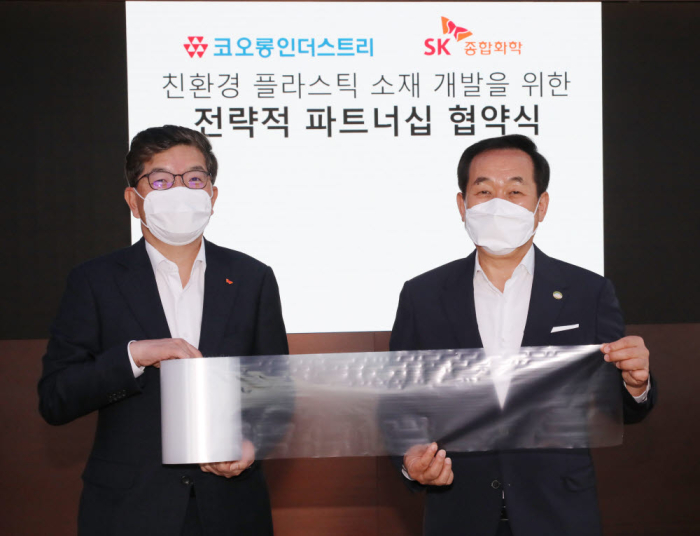Biodegradables
SK, Kolon tie up on biodegradable plastic production
By Apr 07, 2021 (Gmt+09:00)
2
Min read
Most Read
S.Korea's LS Materials set to boost earnings ahead of IPO process


CarlyleŌĆÖs Rubenstein sees commercial real estate undervalued


CJ CheilJedang to sell feed, livestock unit for $1.4 bn


Samsung Electronics' key M&A man returns; big deals in the offing


Money pours in for technology to reshape Korean restaurants



SK Global Chemical Co., a petrochemical subsidiary of SK Innovation Co., will produce biodegradable plastics together with chemical and textile heavyweight Kolon Industries Inc. from the third quarter of this year.
SK Global Chemical and Kolon Industries have signed a strategic partnership to produce polybutylene adipate-co-terephthalate (PBAT) plastic, according to the two companies on Apr. 7.
SK and Kolon by 2023 will annually manufacture 50,000 tons of PBAT, the highest output of biodegradable plastic in the country.
PBAT is a biodegradable plastic that biodegrades in nature within six months through air, sunlight, heat and enzyme reactions, whereas a typical plastic material takes more than 100 years to biodegrade.
PBAT also has an eco-friendly advantage over other biodegradable plastics, including polylactic acid (PLA) plastics, which unlike PBAT require certain soil conditions such as high temperature and humidity for degradation.
The two companies launched a research project last year to develop a biodegradable plastic material. Within a year of this joint effort, they are on the brink of the first mass production of biodegradable plastic in South Korea.
While PBAT is a biodegradable plastic, it is not a bioplastic, which is produced from renewable biomass sources such as vegetable oil, corn or sugar cane. PBAT is made using petroleum-based materials.
The PBAT will be used in agricultural bags, disposable bags and fishing nets.
Under the deal, Kolon Industries will offer support regarding the mass-production process and facilities management, based on its nylon and polyester production know-how.
ŌĆ£We expect great synergy from the two companies in establishing an eco-friendly plastic ecosystem. Kolon will continue to develop new materials that contribute to sustainability,ŌĆØ said Kolon Industries CEO Jang Hee-goo.
SK Global Chemical, as the only manufacturer and supplier of the base material used in PBAT production, will build on its technical expertise of eco-friendly packaging materials.
The global biodegradable plastics market is growing at a sustained rate, driven by tougher regulations across borders, projected to reach $13.1 billion in 2027 from $4.6 billion as of 2019, according to the research firm Allied Market Research.
ŌĆ£This partnership will put us a step ahead of the competition in the biodegradable plastics market and in establishing an eco-friendly plastics ecosystem,ŌĆØ said SK Global Chemical CEO Na Kyung-soo.
Write to Hyung-kyu Kim at khk@hankyung.com
Daniel Cho edited this article.
More to Read
-
 Foldable devicesKolon to supply display film for world's first foldable PC
Foldable devicesKolon to supply display film for world's first foldable PCApr 05, 2021 (Gmt+09:00)
2 Min read -
 EV tie-upSK, POSCO agree to develop new lightweight materials for future mobility
EV tie-upSK, POSCO agree to develop new lightweight materials for future mobilityMar 08, 2021 (Gmt+09:00)
1 Min read -
 Joint VenturesSK Group to sell stake in petrochemical arm; seeks global partnership
Joint VenturesSK Group to sell stake in petrochemical arm; seeks global partnershipFeb 23, 2021 (Gmt+09:00)
2 Min read -
 Hydrogen economyKolon Industries to mass produce key material for fuel cells
Hydrogen economyKolon Industries to mass produce key material for fuel cellsNov 19, 2020 (Gmt+09:00)
2 Min read
Comment 0
LOG IN


